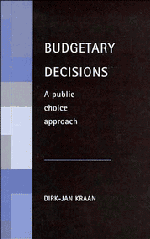Book contents
- Frontmatter
- Contents
- Foreword by Gordon Tullock
- Preface
- 1 Introduction
- 2 The structure of the budgetary process
- 3 Demand in the public sector
- 4 Supply in the public sector
- 5 Political decision-making
- 6 Bureaucratic decision-making
- 7 Institutions
- 8 Ways to reform
- Mathematical appendix
- List of symbols
- Glossary
- Notes
- References
- Index
Foreword by Gordon Tullock
Published online by Cambridge University Press: 20 January 2010
- Frontmatter
- Contents
- Foreword by Gordon Tullock
- Preface
- 1 Introduction
- 2 The structure of the budgetary process
- 3 Demand in the public sector
- 4 Supply in the public sector
- 5 Political decision-making
- 6 Bureaucratic decision-making
- 7 Institutions
- 8 Ways to reform
- Mathematical appendix
- List of symbols
- Glossary
- Notes
- References
- Index
Summary
Public Choice should be a tool for improved management of the government. Dr Kraan has taken a major step in this direction by applying it to the actual process of budgeting. The book is not only a step forward in theory, it should be a major step towards making Public Choice a practical aid to a number of officials and politicians.
Speaking for myself, one of the more important aspects of this book is that it indicates that a lot of theoretical work which was actually developed to a large extent by Americans looking at the open American government also applies to European governments, although there things are less open. This is no surprise to me. I had always thought this was true, but I am delighted to have evidence instead of having to depend on my instincts. Here, again, Kraan has made a major step forward and pointed the way to what we hope will be considerable additional research.
There are also fairly sizeable theoretical improvements here. Relying on his experience, Kraan argues that the bureaucracy, in those areas where the differences among politicians are not too great, plays a constructive role. It tends to clarify and bring together the positions of the politicians, with the result that the endless cycling which may be regarded as the inevitable consequence of the Arrow theorem does not occur. In those cases where the differences among politicians are sizeable, Kraan follows a hint from the ‘Calculus of Consent’, arguing that as long as all of the proposals are for increasing the budget it is possible for log-rolling to lead to a definite outcome.
- Type
- Chapter
- Information
- Budgetary DecisionsA Public Choice Approach, pp. xi - xiiPublisher: Cambridge University PressPrint publication year: 1996



